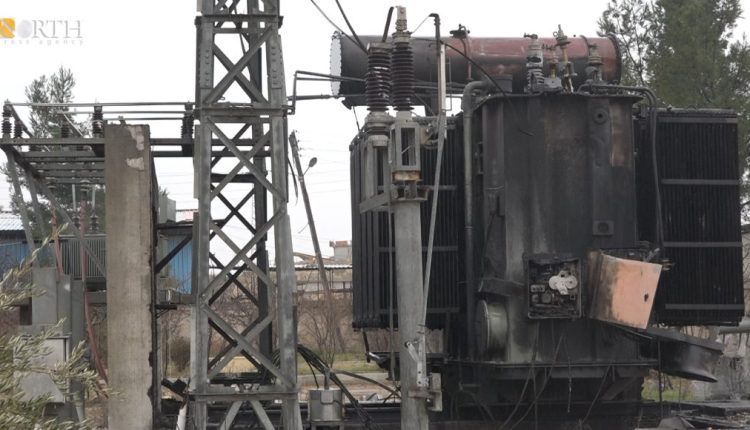
By Fattah Issa
KOBANI, Syria (North Press) – The city of Kobani, northern Syria, had only begun to experience an improvement in electricity service, when Turkish airstrikes targeted power stations on Jan. 14, permanently cutting it off.
Mustafa Haji Bouzan, 40, a resident of Kobani, laments the electricity situation. “Recently, the electricity service had improved, supplying the city for about 14 hours. However, Turkey’s targeting of the electricity station deprived the people of its service,” Bouzan said.
Bouzan talked about the residents’ suffering due to the complete lack of electricity in the city and its countryside. “Most daily activities of life are linked to electricity, not to mention industrial facilities that were also affected,” he told North Press.
In the first half of January, Turkey targeted 89 sites with 122 strikes, including 62 by drones and 22 by warplanes.
Turkish airstrikes primarily focused on electricity and fuel production stations and substations, as well as checkpoints of the Internal Security Forces of North and East Syria (Asayish). The airstrikes also targeted four security and military sites of the Syrian government forces.
Turkish airstrikes on two electricity substations in Kobani Region have deprived the residents of Kobani city and its 360 surrounding villages, as well as those in the town of Ain Issa and 300 villages in its countryside, of electricity.
Abdulqader Bouzan Suleiman, a guard at the electricity station, was present when the Turkish airstrike hit. He was sitting in his room when he heard a loud sound. He went outside and saw the shell that hit the parking space next to the station.
Suleiman told North Press that he went out into the street and stood near the main door of the station. He said a second drone strike targeted an electricity transformer in the station. When the fire trucks arrived at the station, another transformer in the station was targeted, he added.
Aisha al-Nasser, co-chair of the Energy Office of the Autonomous Administration of North and East Syria (AANES) in Kobani, pointed out the airstrikes put the electricity substation in Ain Issa, out of service.
Al-Nasser said that the airstrikes targeted a 10 MW transformer, which supplied electricity to Ain Issa and its countryside. The attack resulted in a power outage in the town and 300 surrounding villages.
Al-Nasser said that the residents of 660 villages in the countryside of Kobani and Ain Issa were deprived of electricity service.
She told North Press that after Turkey’s airstrike on the station in Ain Issa, the electricity station in Kobani was targeted twice. Drone strikes targeted two transformers, each with a 30 MW capacity, which supplied electricity to Kobani and its countryside.
The Energy Office in Kobani estimated over $1,5 million in losses caused by the Turkish airstrikes on the Kobani electricity station.
Al-Nasser emphasized the difficulty of finding spare parts for the damaged transformers, in addition to facing challenges in repairing them for the time being.
Turkish aircrafts launched seven airstrikes on power stations in Kobani and Ain Issa as well as in Amuda, Tirbe Spiyeh (al-Qahtaniya), Qamishli, Derbasiyah in northeastern Syria. The airstrikes put the stations out of service, according to statistics announced by the AANES.
As for the oil sector, Turkey launched seven airstrikes on oil plants, according to the General Directorate of Fuel of the AANES. The attacks targeted five sites, including the Sweidiya gas plant, the Awda oil field, the Taflah Refinery station, the Gire Pire Refinery, in addition to targeting warehouses for maintaining oil fields in northeastern Syrian.
